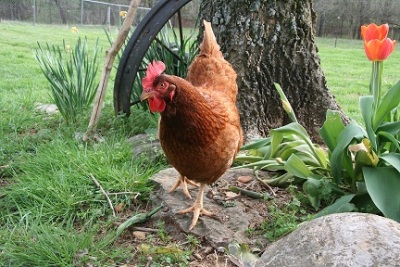
Last week, I mixed up some pancake batter and marveled at how a few of Elizabeth’s eggs can tint the batter orange. I don't talk much to my kids about factory farming as I'm not out to turn them into militant animal activists or anything, but this time I couldn't help myself. “Did you know that most of the eggs from the grocery store come from chickens kept in little metal cages?” Finley asked why — not so much a “curious” why as a “that's the stupidest thing I ever heard” why.
It is ridiculous to think that man can substitute for or improve on nature, but we try all the time, and it frequently comes back to bite us in the hind end. Thousands of chickens cooped up in big buildings receive a diet considered nutritionally adequate, and the sickly, yellow yolks of their eggs tell me something is missing. Chemical fertilizers designed to revolutionize farming cannot synthetically replicate all the nutrients and material packed in a pile of chicken poo, and now most of America's farmland has been transformed into depleted and lifeless dirt. Shelves of processed food might save us from hunger, but it has led to heart disease, obesity, and a myriad of other health problems in this country. All because man exploits nature instead of cultivating and caring for it. But I digress.
Elizabeth was a long time coming. I grew up the daughter of a gardener and helped can tomatoes annually. After high school, I worked in a nursery, rescuing reject plants, putting them wherever I could find a spare patch of soil. Wherever I moved I planted, leaving a trail of perennials and flowering shrubs in my wake. When my husband and I purchased a half-acre lot in Nashville, I surrounded the home with flowerbeds while a sizable kitchen garden grew out back. Still, it didn't seem enough. I began to fantasize about owning land out in the country where I could have that dairy cow I had obsessed about since high school, where I could plant a massive garden and orchard and let the kids run free. I began to talk about my desire for a farm with my husband and began weighing the consequences. One night, I sobbed out my main reservation: “I don't know the first thing about chickens!”
So I started reading all sorts of books. Barnyard in Your Backyard started teaching me what I didn't know about animals. I picked up M.G. Kain's Five Acres and Independence: a Practical Guide to the Selection and Management of the Small Farm for other obvious reasons. I stumbled upon Scott Chaskey's This Common Ground: Seasons on an Organic Farm and Louis Bromfield's Pleasant Valley. These books related helpful information, but also personal experience and insight. They held something that stirred my soul: stories of people who loved and cared deeply for creation, people who wanted to work with nature rather than in spite of it.
Raised in a church that had a habit of focusing on the end times, the unspoken message was that the earth was disposable, something to be used until destroyed in the end. I think many Christians still have this mentality, but the earth is a gift to us, a gift I believe we should not exploit but cultivate and keep, as Genesis 2:15 says. Notably, those words “cultivate” and “keep” can also be translated “serve” and “protect.”

Wendy Knight lives with her husband and three kids on 10 acres they purchased a year ago. They call their place "The Funny Farm" and are working toward a more self-sustained existence. Wendy is incredibly grateful and humbled by this chance to raise her kids and grow older out in the country, just a little bit closer to nature. Her hope is that as her son watches the tulips unfold in the morning's sunlight, and as her daughters collect eggs from the coop, they will come to appreciate the beauty and provision that God has given — His creation. And, just maybe, they will enjoy seeing those fluffy chicken bottoms as much as she does.














